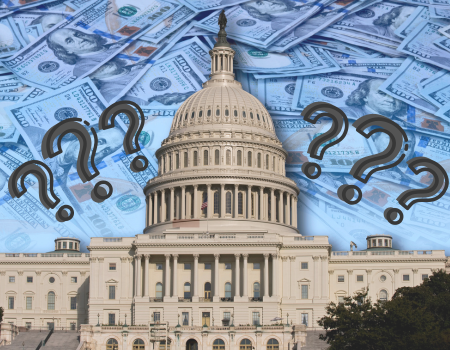The Strategic Partnerships (SPI) firm turned 30 this year. That is shocking especially to me since I remember the company’s birth as if it were yesterday. The job I hold has been one of the most enjoyable experiences ever… and I’m not sure I’ll ever quit since I love this a lot.
Recently, I was asked what wisdom I could share after three decades of providing business development services to companies in the U.S. government marketplace. After some reflection, I’ve decided to share a few insights I’ve gathered along the way. Today’s column is for those who’ve asked for advice—and I hope it offers something useful.
From the start, the SPI team brought a deep understanding of public sector culture, the governing structures, the timelines for fiscal years and the legislative process. We had firsthand experience from the inside—those of us who held elected offices understood politics, and other team members understood everything there was to know about budgets, open records requests and how to navigate the bureaucracy.
As we began working with clients, they offered valuable, on-the-ground insights from an alternative perspective. We saw just how challenging it could be to schedule a meeting with a government decision maker in a state agency, or a city manager in a city. We quickly realized that the marketing materials they used for private sector presentations were not going to resonate in meetings with public officials. We also heard about the frustration of promising meetings that led to silence or investing months into proposals with little to no feedback after a loss. And that’s exactly what our clients asked us to address—and what we set out to improve.
On a weekly basis, we worked with clients to strengthen their understanding of public sector expectations—emphasizing the importance of ethics, transparency and consistent follow-through after a meeting. We continually stressed the need to build relationships and stay in touch with reference accounts throughout the often-lengthy public sector sales cycle. One of the hardest things for companies to understand has always been why government sales move so much more slowly than those in the commercial sector.
We spent time teaching clients why counties are structured differently than cities and why that jurisdiction is more political than other jurisdictions. We taught companies how to produce proposals that were localized, how to network successfully with public officials and how to negotiate contract closures after being named a finalist. Too often, we saw clients lose the chance of closing a contract because of exceptions taken by their attorneys. That resulted in many companies asking for us to spend time with their legal divisions… which we did.
Many times, in those very first years, we marveled about the size and depth of the U.S. government marketplace. Looking back now, I’m still struck by how many new clients we brought on in that first year—and even more so by how many of them stayed with us for two or more decades. One large public company that we closed 48 hours after we opened our doors in 1995 is still a client today… and we’ve seen clients grow from selling to government entities in one state to now selling in multiple states. It has never been dull and no day has ever passed when we did not discover some new nugget of knowledge.
So, here’s a bit of advice I can share about how to be successful in the largest marketplace in the world—the U.S. government marketplace:
- Understand and respect the fact that you are selling into the world’s largest and most competitive marketplace. It will require patience and continual diligence. The contracts are larger and can easily be replicated in other states, so it is worth the patience and time it sometimes takes to get started.
- Know who your competition is and learn everything you can possibly learn about what they offer, how they present, how they price their offerings, how they network and where they hold contracts.
- Master the skills required for an exceptionally good introductory meeting. Never attempt to do a consultative sales presentation to a public official. Present your credentials in the first 3 minutes, and then move immediately into a conversation about what you have to offer, the problems it solves and the benefits that accompany it. Does it save costs, reduce resources or improve efficiency? What else?
- Determine where the highest demand will be for your offerings and spend the time it takes or get help to develop a great Go-to-Market strategy. Your messaging is very important.
- Look for partnerships and make friends with other vendors. These friends are often a great source of information.
- Get positioned with decision makers and stakeholders before bidding on a project. Public officials are risk-averse. They like to do business with people they know and trust.
- Understand that just responding to solicitations has a very low rate of success. If the decision makers don’t know you, the chances are you’ll not be selected.
- Find some contracting vehicles that will allow you to skip a formal procurement process. Either learn or ask for assistance to know which type of contracting vehicle each jurisdiction likes to use.
- Learn how to submit Open Records Requests (FOIAs). If you don’t know how to correctly verbalize what is required, you won’t be successful.
- Always ask for an exit Interview if you are not selected after you present a proposal. Explain that you hope to compete again in the future and you want to know how to improve on the next proposal effort. Most procurement officials will honor that request and the learning value is huge.
- You need reference accounts so always remember that after you start closing contracts. Stay in touch to make sure that the services you provided were good and build a friendship if you can with the person who will be contacted to check your references in the future.
I could go on and on… but hopefully this small bit of advice will prove to be helpful. Whatever your offering may be, there’s a good chance the government marketplace needs it—and you should feel confident sharing it with our colleagues in the public sector.
In closing, I have one more thought. At times we have brought companies into the U.S. government marketplace from other countries. When we have done this, we often introduce them to existing prime contractors and get them started in subcontracting roles until they are comfortable with being a prime themselves. I have often realized that smaller firms entering the public sector marketplace should do the same thing. Many public entities have mentor-mentee programs. If you are a smaller firm, these programs can be of immense value.
And finally… if you’re looking for guidance or simply want to talk through your approach, the Strategic Partnerships team is always here to help.







